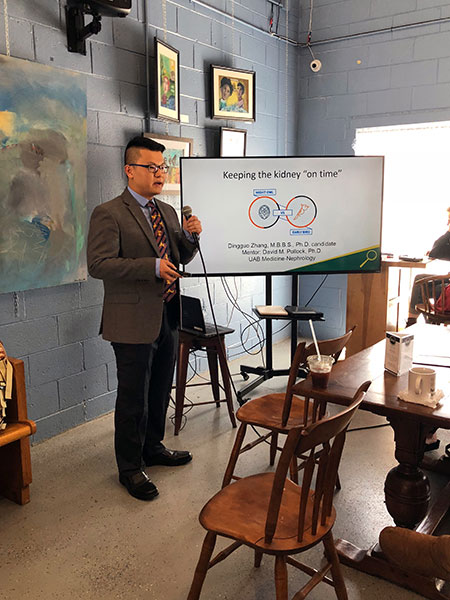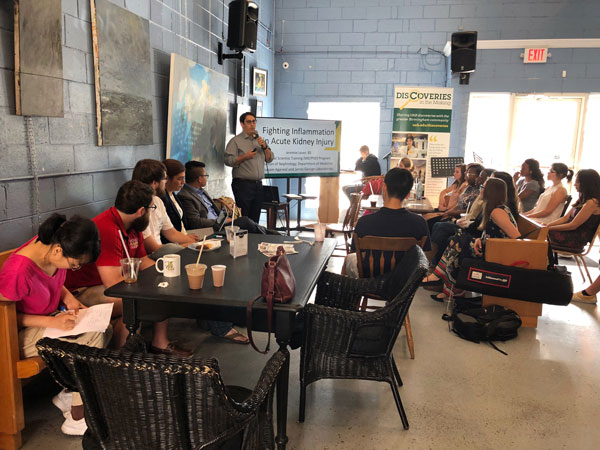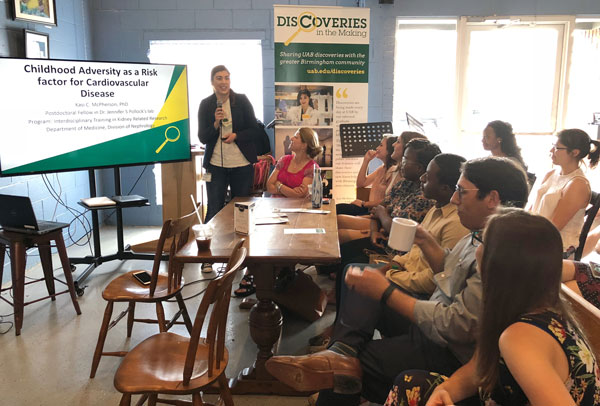The KURE (Kidney Undergraduate Research) Program is a summer long internship where undergraduates are paired with mentors to engage in kidney-related research. In addition to working in a research lab, students have the opportunity to complete professional development sessions, shadow physicians and present their summer research. At the June 24th Discoveries in the Making, three trainees presented research from KURE-affiliated laboratories in the Division of Nephrology at UAB.
Tick Tock, It’s Kidney Time

The kidneys have a number of important functions that, when disrupted, can have long-lasting effects on the body. One of those functions is regulating blood pressure. Increases in blood pressure can increase risk of cardiovascular disease. While blood pressure fluctuates normally, the amount of salt ingested can also contribute to elevations in blood pressure. Americans eat significantly more salt than necessary, which impacts normal kidney function. Alterations in kidney function can subsequently lead to increases in blood pressure. However, the mechanism through which kidney homeostasis affects blood pressure is unclear.
Dr. Dingguo Zhang, a postdoctoral fellow in the laboratory of Drs. Jennifer and David Pollock, examines genetic factors in kidney function that help regulate your internal clock. Bmal1 is a naturally occurring internal clock found in the kidneys that helps sustain normal function. In his research, Zhang compares normal mice to those with Bmal1 removed to determine Bmal1’s role in regulating blood pressure. Zhang’s research suggests that Bmal1 regulates blood pressure throughout the day and the loss of Bmal1 in the kidneys leads to reduced blood pressure in males, but not females. His research is important to understand how impairments in kidney function influence subsequent daily blood pressure fluctuations that increase the risk of cardiovascular disease.

Fighting Inflammation in Acute Kidney Injury
Acute kidney injury (AKI) occurs when there is a sudden loss of vital kidney function, which can be caused by lack of blood flow to the kidney or even because of the adverse effects of some medications. AKI often results in longer and more complicated hospital stays, increased risk of developing chronic kidney disease and can result in death. Unfortunately, there are no effective treatments available for this disease. Interestingly, the immune system is important in the response to AKI and can affect whether a victim heals or not. Specifically, macrophages are immune cells that either circulate or live inside the kidneys, and they are essential to the healing process after AKI. For example, after injury, macrophages are responsible for removing dead cells and debris, which is required for proper healing.
Jeremie Lever, an MD/PhD student at UAB, has dedicated his PhD research to targeting the immune response to AKI to find a treatment. Lever works in the laboratories of Drs. Anupam Agarwal and James George. As a result of his studies, Jeremie has found evidence that the source and lineage of subsets of macrophages in the kidneys can be distinct, and this may provide support for a macrophage-based-immune therapy for AKI. This therapy would use the immune system to reduce harmful inflammation and promote healing so as to reduce the impact of kidney injury on overall health. Lever plans to become an academic nephrologist and scientist to continue his work fighting bad inflammation in AKI.
Childhood Adversity as a Risk Factor for Cardiovascular Disease

Early life stress such as neglect and abuse during childhood can produce prolonged activation of the internal stress system. Prolonged activation of this system can contribute to a variety of cardiovascular illnesses in adulthood. Those who experience early life stress also tend to be smokers, consume more alcohol and even have a higher incidence of suicide. In her research, Dr. Kasi McPherson is interested in how early life stress contributes to cardiovascular disease in adulthood.
McPherson currently works as a postdoctoral fellow in the laboratory of Dr. Jennifer Pollock. Using a mouse model of early life neglect to study gene-environment interactions, McPherson has determined that greater concentrations of the vasoconstrictor peptide Endothelin-1 (ET-1) were associated with early life neglect. Additionally, this relationship may work through an enzyme called HDAC9 that controls changes in gene expression. Early life stress and greater ET-1 are also associated with poorer vasoconstriction, which poses a higher risk for cardiovascular illness. McPherson would like to continue this research to examine these directional relationships in gene-environment interactions.